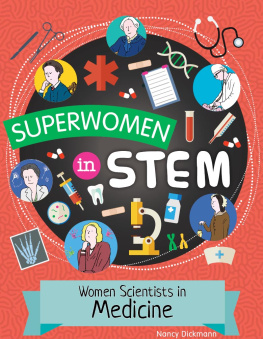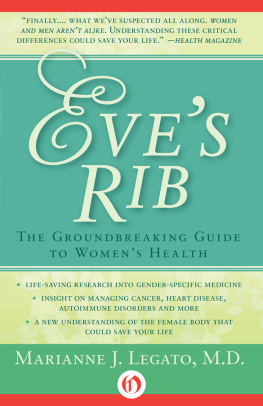


To John Pepper, who made it all possible, and from whom I learned so much
Contents
Introduction
The Anatomy of a Quarrel
Acknowledgments
Warmest thanks to the following individuals:
Richard Curtis, my beloved agent, who convinced me that this book should be written;
Leslie Curtis, whose finely honed intelligence set a clear course for me when I found the road difficult to navigate;
Heather Jackson and Tami Booth, my editors at Rodale, whose enthusiasm for the project never flagged;
Laura Tucker, who helped make my scientific prose accessible to all of you;
Christiana Killian, whose ability to communicate has taught me the value of clarity, content, and charm in making any point.
Introduction:
The Anatomy of a Quarrel
L iz walks in the house to find her husband watching football in the den, while their toddler plays at his feet. She can tell that Ella has logged some serious playground hours from the sweaty smell that greets her as she leans over for a kiss. Did you have a big day at the park, sweetheart? Did you have fun on the slide?
The house is a disaster, and theyre expected at Tims parents house with as-yet unbaked cookies in an hour. Liz dials a colleagues number as she takes ingredients out of the fridge. Phone cradled to her ear, she learns that an e-mail with important information for tomorrows meeting still hasnt arrived. She relays a modification to their up-coming presentation as she adds chocolate chips to the batter.
Cookies in the oven, Liz heads toward the bedroom, stripping as she goes. She calls to Tim over her shoulder, Will you get Ella ready to go? Ive left her dress and shoes out.
When Liz emerges, she finds Tim pacing impatiently by the door. Leaning over to adjust Ellas dress, she sees a sticky patch in her daughters hair. You cleaned her up, right? she asks. Yes, Tim says, exasperated. Were late. Lets go.
But when Liz reaches over to take Ella out of her car seat at her in-laws house, she catches a whiff of that same coppery, sweaty play-ground smell. On inspection, Ellas pudgy hands, filled with Cheerios, are gray with grime.
Her hands are filthy, Tim! Liz hisses.
Ill deal with it when we get inside, he says, bewildered by her tone. Liz feels her growing irritation spill over into rage. Thats not the point, Tim. Why didnt you see how dirty she was when you were changing her? Look at her face! She needed a bath. This means that shes been eating dirt the whole time, which is completely disgusting, not to mention unsafe. Whats wrong with you?
Tim turns on his heel, jaw set, and stalks into the house. Kids eat dirt; shell survive. Liz follows him, but her torrent of reproaches prompts no reply from her stony-faced husband.
Once theyve settled into the party, Tim recovers his equilibrium, but finds that his wife wont respond to his attempts at conversation. More confounded than empathetic, he engages his uncle in a heated and detailed discussion of the days presidential press conference; within moments, the political discussion has completely eclipsed Lizs distress in his mind.
Tims sister, on the other hand, takes one look at Lizs flushed face and dilated pupils and pulls her into the kitchen for a hug and a chat. I cant believe him! Liz fumes. She looked like something out of Oliver Twist! What was he thinking, putting her in a party dress without even bothering to take a swipe at her face and hands with a washcloth?!
The case against Tim builds. Lead levels in the soil in our neighborhood are astronomical. As if we didnt get enough of a scare after the renovation, when the first tests came back high for lead. Does he want her to have brain damage?
And builds. I asked him to put her in her dress. I asked if hed cleaned her up. How much more specific do I have to be? When I leave her with him, do I have to remind him not to put her in the oven too?
Liz is on a slow simmer for the rest of the night. She goes over and over the argument in her head on the drive home. Unable to sleep, she reviews the notes for the following days presentation, still analyzing the argument in the back of her mind.
The next morning, Liz rebuffs Tims invitation to make love and arrives at the breakfast table determined to find some kind of resolution. As usual, Tim resists any attempt to have a substantive discussion about the argument or what it means for their relationship. He doesnt care about me, Liz thinks miserably. He doesnt care that Im unhappy.
In fact, Tim doesnt even really know why shes mad. Why, he wonders for the hundredth time, does every little thing have to turn into a full-blown drama? Why does she have to make such a big deal out of everything? And why, when its over, cant she just move on?
The Sex-Specific Brain: What It Means for Human Relationships
Seen one way, Lizs fight with Tim is nothing more than a commonplace, garden-variety marital spat. But in another light, it perfectly typifies what so often goes wrong between men and women, and why.
Were Different!
Liz and Tim dont have a bad marriage, but when they fight like this, they feel completely alienated from one another. I cant understand how we can see the same things so differently. Its like hes another species entirely, she says. Tims not an alien; theyre just different. Our mistake, whether were male or female, is to wantto insist, hanker for, demandus to be alike. And the simple, irrefutable, fabulous fact is that we are not.
The differences between males and females are dramatic and in-controvertible to anyone whos even casually observed animals. My male pug is bigger, stronger, and much more active than his sister. While she spends hours quietly wrapped around my feet and hides if she knows its cold or raining outside, he wanders through the house in search of a favorite toy, nips at her leg to encourage her to get up and play with him, and loves to go out for walks, taking on every pigeon in his path.
Why are they different? Over the past decade, there has been a crescendo of interest in exploring the precise nature and importance of the differences between men and women. The new science of gender-specific medicine is producing an amazing appreciation of how our biological sex modifies the way we operate in the worldand even our experience of disease. We are different, and vastly so, in every system of the body, from the skin that covers us, to the hearts that beat within our chests, to the guts that process the food we eat.
Nowhere is this more true than in the brain, the 3-pound organ that houses all that makes us human: our passions, our insights, our appreciation of the created world, our entire intellectual and emotional lives.
Men and women think differently, approach problems differently, emphasize the importance of things differently, and experience the world around us through entirely different filters.
Starting in the womb, and for as long as our lives last, we receive information into sex-specific brains that are significantly different in anatomy, chemical composition, blood flow, and metabolism. The very systems we use to produce ideas and emotions, to create memories, to conceptualize and internalize our experiences, and to solve problems are different.
Next page










